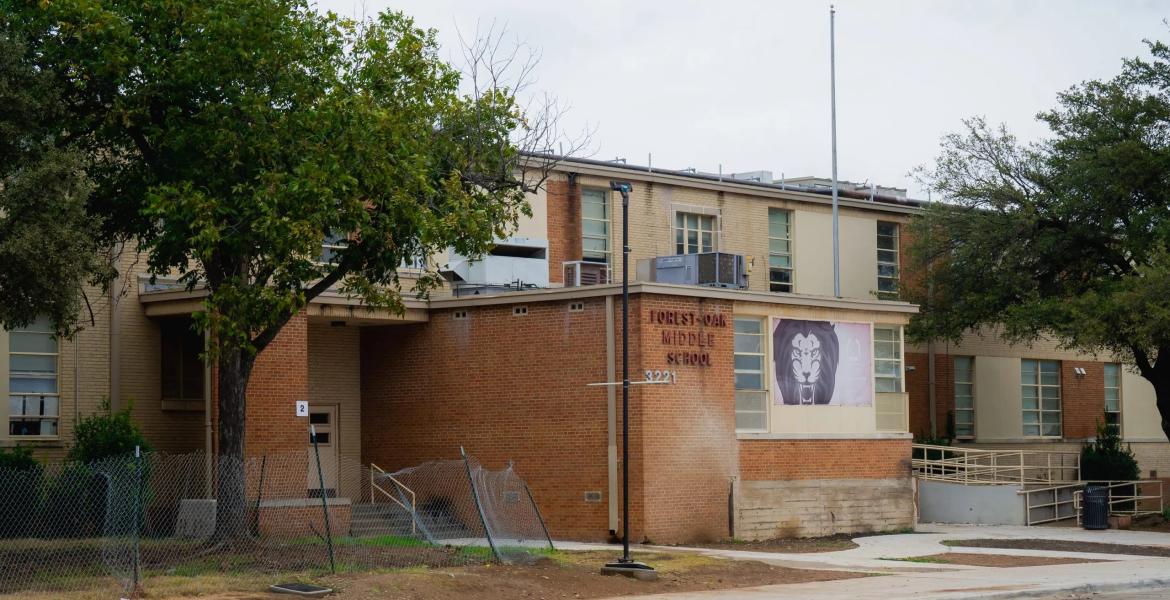Barrett Brown, 3, of Wall, Texas swayed back in forth in unison to the sounds of Katie Perry on the radio as he enjoyed a large M&M cookie. Prior to enjoying his savory treat, Barrett spent some time enjoying the feel of the inflatable play areas set up for sensory enjoyment Saturday morning during the Summer Fun Come Out and Play at The Shape of Behavior, 439 W. Harris St. in San Angelo.
The event is one of many held every other month by the organization for children with autism, their families, and anyone else with developmental disabilities and their families, said Stephanie Bewley, a Board Certified Behavior Analyst (BCBA) and the local director of The Shape of Behavior clinic in San Angelo.
“We try to do [these events] every month, but it’s been more like every other month,” Bewley said. “They’re basically a day out for the family.”
At Saturday’s family day in the sun, the families of four of the Autistic patients who attend the clinic and their siblings enjoyed bouncy houses as well as snacks and cool refreshments provided by a Kona Ice Truck. Some kids, however, found the weather a bit warm and made their way inside the house-style clinic with its six rooms (not including bathrooms) designed with aesthetically pleasing colors, and filled with age-appropriate naturalistic and structured activities.
Every room in the house serves a purpose, and that’s to provide a “home-like” feeling to the clinic, Bewley said.
“Our organization is referred to as a clinic. We don’t want [our patients], however, to feel like they’re in a sterile and cold place. We want to provide a happy, friendly and energetic home feel,” the director said.
Feel is an important aspect for children with autism because they’re sensitive to environmental stimuli. According to the “clinic’s,” information packet, Autism is “a disability that typically appears during the first three years of life, and it is the result of a neurological disorder that affects the normal functioning of the brain, impacting development in the areas of social interaction and communication skills.”
In other words, children with autism react differently to environmental stimuli and have a hard time communicating their ideas in ways most of us do naturally. This is why many kids like Barrett do not want to make eye contact, and can react negatively to loud noise.
However, the activities set up for Saturday’s event were designed to help.
“Sensory activities consist of a lower and higher stimulus that they can feel. Some prefer low noise, and some prefer high. It provides a good medium so they can be in a classroom and function. They can deal with the noise,” said Jeremiah Keith, a full-time therapist at The Shape for the past four months and a full-time student at Angelo State University.
Brooke Maris, another therapist at the clinic, said these activities, along with the design of the clinic’s rooms, are structured by age and each patient's functioning level. The naturalistic approach to learning includes child-led activities that help the children elaborate and expand on a topic while structured activities are teacher led.
“All the activities expand their minds,” Maris said.
The clinic’s online website states, “Because we evolve with our science, The Shape is committed to using the continual monitoring and shaping of our behavior analytic strategies and methods for success. We work hard to make sure our clients have the best behavioral services and autism therapy on the market today.”
For Corey Brown, Barrett’s mother, these strategies have made an impact not only on Barrett's life, but also on her family’s.
“It is making a huge difference in our lives,” Brown said “The therapists not only know how to teach, but they’re teaching me how Barrett learns, so I can follow through with his tasks at home.”
At 3 years old, Barrett does not have words he can communicate verbally, but since starting The Shape in January of this year, Barrett has experienced “a signing explosion.”
Brown said her son can now communicate 10-15 signs on his own, and he’s learning to do many things on his own.
Feedback like this lets Bewley know she made the right choice in advocating for and opening the clinic when she and her husband moved to San Angelo from Tempe, Arizona in August 2014.
Bewley, 26, is originally from Colorado Springs, but she moved to Arizona where she completed her bachelor’s degree in psychology at Northern Arizona University in Flagstaff, and her master’s degree in Applied Behavioral Analysis (ABA) at Arizona State University in Tempe.
“I came here because my husband works and attends Angelo State University, a different ASU,” Bewley said.
When she first came to San Angelo, the therapist said she learned there were some services available to children with autism, but she wanted to provide more. There are some licensed BCBAs in San Angelo, but none of them are full-time, and she wasn’t sure how many of them would be able to provide the amount of peer review The Shape offers. Additionally, these BCBAs work through contracts and may not be able to accept insurance--at least not right away. Therefore, parents have to pay for services privately, which can be much more expensive for families. The Shape, because it’s a clinic, accepts insurance to offset the cost of ABA therapy on a full-time basis.
“Research shows that the most effective results for ABA come with 40 hours of instruction,” Bewley noted.
Because of these factors, Bewley and her husband started researching possibilities for clinics that could back the opening of a full-time ABA in the city. Bewley’s husband found The Shape of Behavior in a job ad. After receiving the information, Bewley called and spoke to Houston resident Dr. Domonique Randall, founder of The Shape, and the new resident went through the technicalities of getting a clinic set up in San Angelo.
In August 2014, the clinic opened. Today, it has four patients and is expecting a fifth one soon. Bewley said many people still don’t know about The Shape, but she hopes that changes because of the services the clinic provides and the fact that they have to report to peer review committee members whom review the clinic’s step-by-step approach to ABA and to working with the children. The clinic also has a psychologist who Skypes with the group once a month, and watches the therapy sessions to provide appropriate feedback. Not to mention, all the therapists are applying to become registered behavioral technicians, except Bewley, who is board certified as a BCBA.
That might not be the case with other ABA providers in the area.
“BCBAs who provide services on their own (without the support of a company like The Shape) are their own boss, so they have no oversight,” Bewley added.
Also for the young therapist, starting The Shape has been a life-long dream. She started out babysitting an autistic child when she was 12, and the boy is like a brother to her.
“There’s a lot of motivation to do this if you grow up with a kid like that,” Bewley stated. “I could not help wanting to continue.”
For the other therapists, including Cynthia Romo, 24, who just graduated from ASU last December, they said they enjoy what they do.
“I love it,” Romo said. “I like that [the kids] teach us as well.”
Keith said, “You have your schedule lined up, but you learn something new every day.”
Keith also has learned that even if a child takes one little step in advancement, that’s a big accomplishment. However, the challenge is when a child goes a few months with no progress.
“Sometimes, I’ll ask, ‘Am I doing it right?’ You get frustrated with yourself, but you tell yourself, ‘This is how it works,’ but when you get that progress, you’re like, ‘Yes!’
In addition, since he started, Keith has seen the struggles his patients live with every day.
“We have our struggles, but seeing these patients, just to put their shoes on, is like a major accomplishment,” he added.
The Shape takes children of all ages, and accepts most insurances. Kids can be diagnosed as early as 15 months of age, and if there’s one suggestion Bewley can pass along to parents, it’s for them not to avoid diagnosis because they fear the labels associated with Autism and/or other development disabilities.
Brown and her husband faced that issue with Barrett, and now Mrs. Brown said she wishes she wouldn’t have feared the label. Barrett could have gotten help earlier had she not focused on that aspect
“It’s still such a stigma and viewed as retardation,” Brown said. “That’s what crushed me when we got the diagnosis. However, now I know it’s just a piece of paper.”
For more information about The Shape of Behavior, visit the company’s website by clicking here, or contact (832)358-2655.
Subscribe to the LIVE! Daily
Required






Post a comment to this article here: